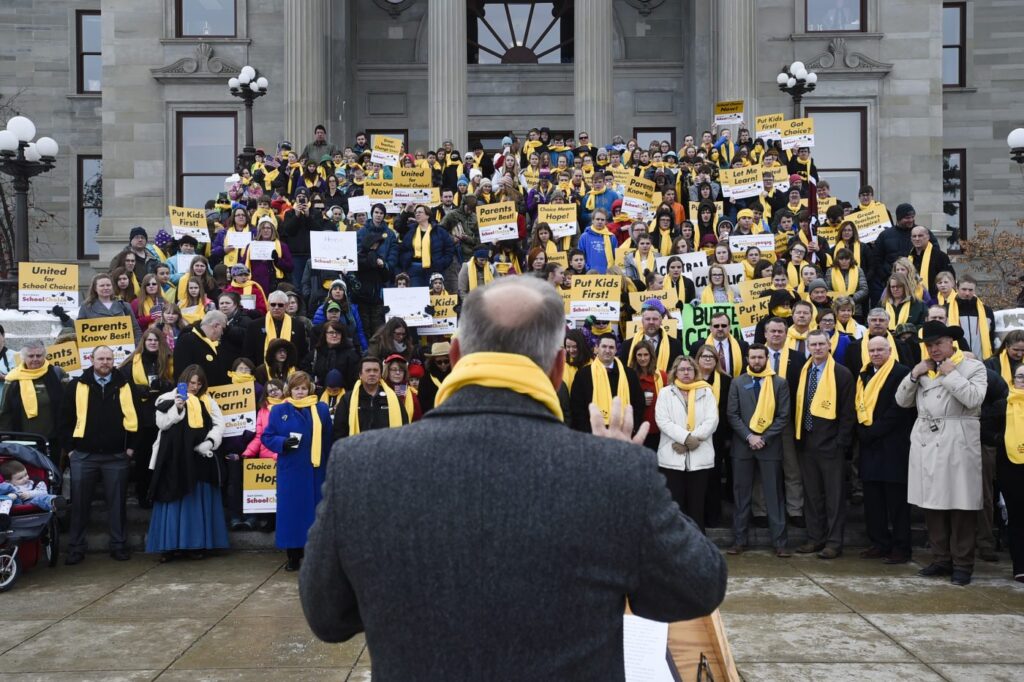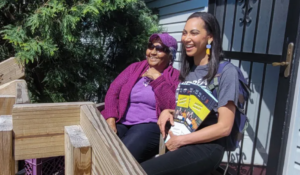Supreme Court says state can’t exclude religious schools

The U.S. Supreme Court on Tuesday said Montana incorrectly excluded religious schools when it created a 2015 tax incentive program to help families pay for private school tuition.
In a 5 to 4 decision split between the court’s liberal and conservative justices, the court discarded a 2018 Montana Supreme Court ruling that had killed a private education tuition assistance initiative, setting the stage for lawmakers to potentially expand or create new programs to benefit private schools using state resources.
The challenge arrived in the courts thanks to a lawsuit brought by the Institute for Justice, a national school choice advocacy nonprofit, on behalf of Kalispell resident Kendra Espinoza and two other Montana mothers who hoped to send their children to a private school in Flathead County on the tuition assistance.
At least one conservative Montana organization said after the decision it believes pro-school choice proposals from state legislators will follow.
While the U.S. Supreme Court in previous rulings has upheld school voucher programs and said states could include religious schools in such programs, it hadn’t determined whether states could exclude religious schools.
The state argued that it wasn’t actively discriminating based on religion by not including religious schools in the tuition tax credit program. A majority of private schools in the state are religious.
According to the Montana Supreme Court, using state dollars — even indirectly — to support religious schools would violate the state Constitution’s ban on state aid to religious organizations. Montana is among 38 states with similar prohibitions against public support of religious organizations.
The high court’s majority opinion, written by Chief Justice John Roberts, said that while states aren’t required to subsidize private schools, “once a state decides to do so, it cannot disqualify some private schools solely because they are religious.”
“This decision was a huge victory for Montana kids, and clears the way for Montana to join 42 other states that allow students the freedom to choose a school that fits them best.”
Roberts added that the Montana Supreme Court’s decision should have recognized that the state’s exclusion of religious schools from the program wasn’t a neutral policy decision, violated the U.S. Constitution’s Free Exercise clause.
The case highlighted the divide between private school and public school advocates. Those who cheered the decision said it will give families greater flexibility in choosing how to educate their children.
Those who wanted the Montana Supreme Court’s decision overturned include current Republican U.S. Sen. Steve Daines and Republican U.S. Rep. Greg Gianforte. Both signed on to briefs supporting the Espinoza lawsuit.
Daines is seeking to keep his seat in a race with current Montana Gov. Steve Bullock, a Democrat, who said Tuesday he is disappointed with the decision but will continue to support public education. Gianforte is running to succeed Bullock as governor.
While school-choice advocates praised the decision, others said it could have negative effects on public schools and lead to taxpayer dollars supporting private educational institutions.
“The Supreme Court of the United States decision … undermines the State of Montana’s ability to provide a quality public education for every student,” said Montana AFL-CIO Executive Secretary Al Ekblad. “When funded appropriately public schools are the great equalizer in our society. Private, religious schools that discriminate against students and bleed funding away from public education should not receive tax dollars.”
Before the 2018 state court ruling, the Montana Legislature had created a $150 personal income tax credit for donations to nonprofit scholarship organizations, which could provide money to families and students to help pay for private school tuition, religious or non-religious. But state officials, using the Montana Constitution as a guide, prohibited religiously affiliated schools from participating in the program.
The Institute for Justice, a Virginia-based law firm that has litigated similar school choice cases, then sued on behalf of three Montana mothers who wanted to use the scholarship program to help pay for their children to attend Stillwater Christian School in Kalispell.
The families argued that the state, by excluding religious schools from the program, violated the Free Exercise, Equal Protection, and Establishment clauses of the U.S. Constitution.
“The Supreme Court delivered a major victory to parents who want to choose the best school for their children, including religious schools,” said Institute for Justice senior attorney Erica Smith, co-counsel on the case. “This is a landmark case in education that will allow states across the country to enact educational choice programs that give parents maximum educational options.”
The law firm called the case “one of the most important education reform cases in the past half century,” adding that it will free up lawmakers and officials to expand or start school choice programs in their states.
But Montana Federation of Public Employees President Amanda Curtis said the decision would result in “billions” of taxpayer dollars being siphoned off by private, religious and for-profit schools with no governmental oversight. MFPE represents thousands of Montana teachers and school employees.
“This decision is a slap in the face to our members and the Montana communities they serve,” Curtis said. “Public dollars should support public institutions that benefit all of us, not private, religious institutions that benefit a select few.”
Responding to the decision, Montana Attorney General candidate Raph Graybill, Bullock’s chief legal counsel and the attorney who argued the case for Montana before the Supreme Court, said he would “always fight to defend our state Constitution” and for public education..
“This decision was a huge victory for Montana kids, and clears the way for Montana to join 42 other states that allow students the freedom to choose a school that fits them best,” said Jeff Laszloffy, president of the foundation.
The article was published at Supreme Court says state can’t exclude religious schools





